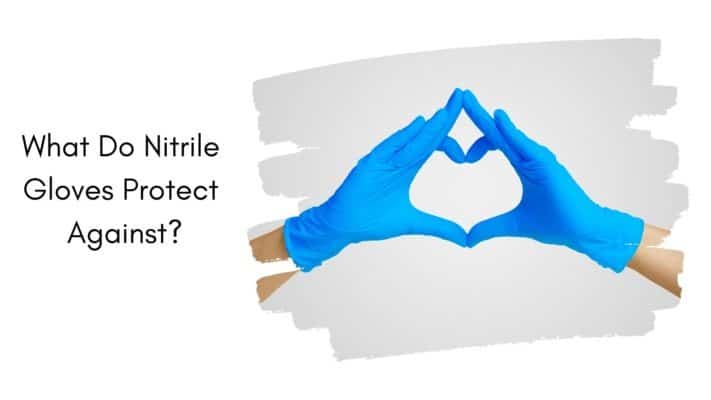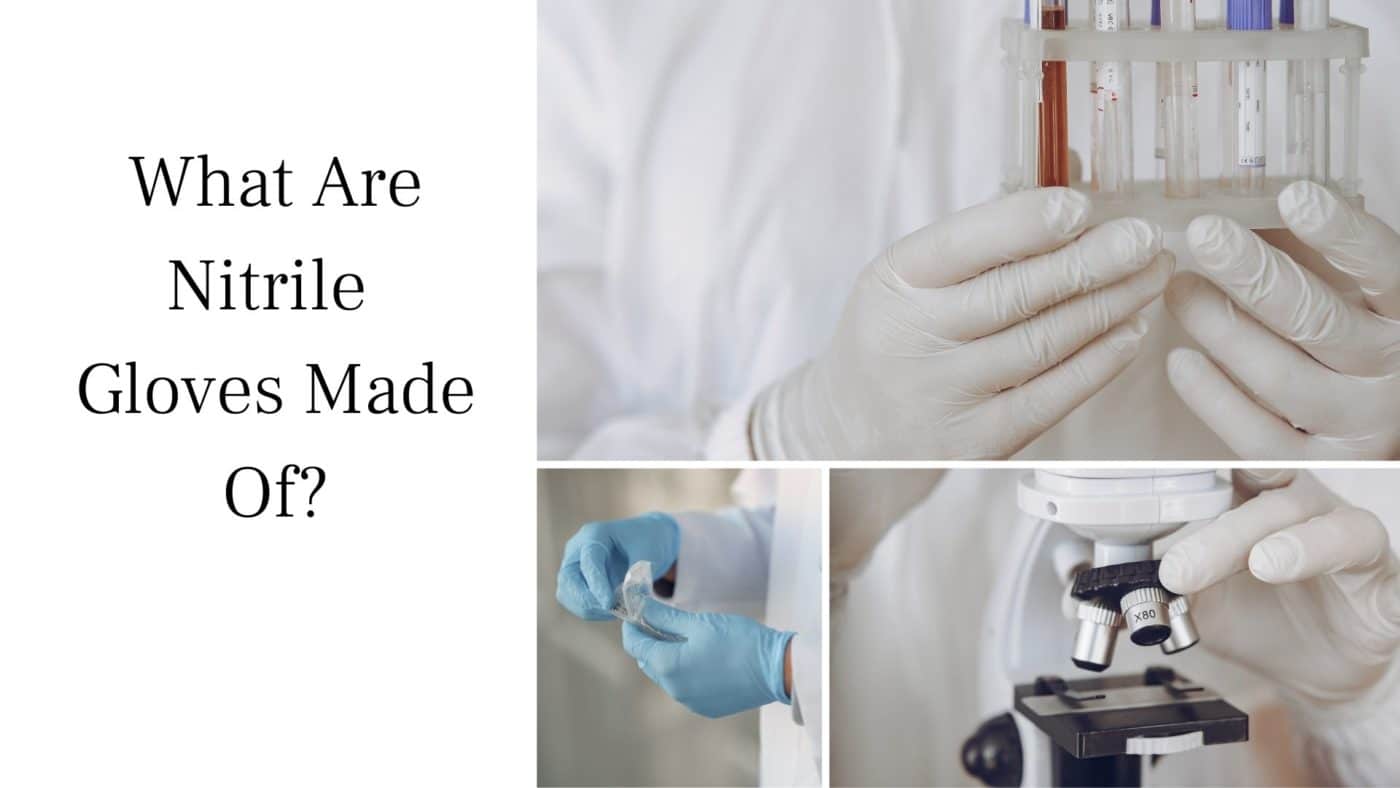Gloves
What Are Nitrile Gloves Made Of & What Do They Protect Against?
When choosing the right protective gloves for your workplace, it can sometimes be challenging to find the most practical glove choice with so many available options on the market. The majority of skin exposures and hand injuries can be bypassed by wearing the correct glove. For one, nitrile gloves are tough, puncture-resistant gloves that protect against a broader range of hazardous chemicals, which is why they are a popular choice for employers to purchase.
What are these gloves made of?
Nitrile gloves are an excellent form of hand protection. The nitrile glove material is made up of a chemical and puncture-resistant material called nitrile. Nitrile is fundamentally a reprocessed form of latex, which is made by combining butadiene and acrylonitrile.
The lifecycle of nitrile gloves begins as rubber that is obtained from rubber trees. Then they get transformed into latex rubber. After getting transformed into latex rubber, they are reprocessed and turned into the nitrile compound material. The extra processing is carried out to remove all the latex proteins. This removal of all latex proteins ensures a lower allergy rate in nitrile gloves than the latex.
What are nitrile gloves used for?
Nitrile gloves are gaining popularity throughout the world. They are commonly used in food processing and food services, medical and dental hospitals, veterinary medicine, senior care, child care, sanitation and janitorial, chemical, manufacturing, and automotive industries. They can withstand many acids, chemicals, diesel fuels, grease, gasoline, mineral oils, and vegetable oils. This is why the Environmental Protection Agency highly recommends the use of nitrile gloves.
Glove Material Evaluation
All standard disposable gloves are evaluated based on three factors when they are exposed to chemicals:
- The Breakthrough Time: How long it takes to identify a substance inside a glove when the outside is exposed to a harmful chemical.
- Degradation: The mechanical changes that occur to the glove, such as shrinking, cracking, or swelling of the material when the chemical comes in contact with a chemical.
- Permeation Rate: The rate at which a substance passes through the glove’s material when exposed to a chemical.
What is Nitrile?
Unlike other disposable gloves on the market, nitrile gloves are produced using a synthetic and robust rubber compound that does not contain any latex and is highly resistant to a range of dangerous chemicals and harsh materials. However, we should note that while nitrile gloves are a protective barrier, they are only meant for brief contact with any chemicals and should be removed and promptly discarded should they become contaminated.
What are other types of disposable gloves on the market?
Other readily used disposable gloves that are on the market include:
Latex
Latex gloves are made from natural rubber and are typically used within the healthcare system, such as dentistry and clinics. However, many people encounter allergies to latex, which can cause them to experience inflammation and rashes, which is something to keep in mind when choosing which type of glove to purchase for your workplace.
Vinyl
On the other hand, Vinyl gloves are typically used within the food processing industry where protection from harmful substances and debris is not required. They are mostly employed to minimize cross-contamination. Therefore, because they are less long-lasting, you will have to change your gloves more often as they tend to puncture easily.

What Do Nitrile Gloves Protect Against?
It should come as no surprise that nitrile gloves are highly appropriate in a range of different workplaces. Whether you’re employed in a healthcare facility, serving food, manipulating electronics, or operating in manufacturing, protective gloves play an essential role in mitigating the risk of potential injuries. Nitrile gloves can also protect against harmful materials such as chemicals, metals, and shattered glass.
By knowing the types of materials and potential hazards that nitrile gloves can protect against and the available options, CanGard can help you make the best choice to ensure the utmost safety for you and your employees in your workplace.
What Types of Chemicals Can Nitrile Gloves Against?
Nitrile gloves protect against the following chemicals including, but not limited to:
- Phenol 1%
- Acetic Acid 10%
- Ethanol 20%
- Nitric Acid 10% & 36%
- Benzalkonium Chloride
- Hydrogen Peroxide 30%
- Formaldehyde 15% & 37%
- Povidone Iodine 10%
- Sulfuric Acid 47%
- Paraformaldehyde 50%
- Glutaraldehyde 50%
How to Optimize Your Nitril Glove Protection
Choose the right size
If you choose to wear a small glove for your hand, it will cause the material to stretch, which will make the gloves less protective overall. On the other hand, a glove that is too large for your hand will also provide you with limited protection from chemical spills and debris. Nitril gloves that are sold on CanGardCar.com come in various sizes. Hence, employers can buy different sizes to meet the unique needs of all their employees.
Select the right thickness
Choosing an appropriate thickness of glove will also help protect you against any harmful chemicals. A thicker glove will provide more protection than a thinner glove. Doubling up gloves can also increase the breakthrough time but can be uncomfortable.
Remove the gloves the right way
After your gloves have become contaminated, it is imperative to remove the gloves the right way to avoid any contact with the skin. By carefully grabbing the top of the glove, pull the material over and towards your fingertips to capture the exposed glove on the inside when you remove the glove.
Avoid any cross-contamination
Once your gloves have become exposed to harmful chemicals, it is essential to avoid any cross-contamination. To reduce the risk of cross-contamination, follow these essential practices:
- Change your gloves immediately
- Discard your gloves immediately
- Wash your hands immediately and look for any signs of contamination to the skin
- If contamination of the skin is visible, seek medical attention right away.
- Make sure also to disinfect your surrounding areas as soon as possible.
Purchase the highest-grade Nitrile Gloves in Canada
We take your protection seriously. CanGard Safety and Medical Supplies has a wide range of nitrile gloves for purchase on our website.
We understand the importance of keeping your employees safe from harmful chemicals and debris, which is why we take pride in supplying a wide range of nitrile gloves to fit your unique workplace needs. No, what workplace you work in, we are your #1 solution for protective gear. With 22 different types of nitrile gloves, you are sure to find what you are looking for.

